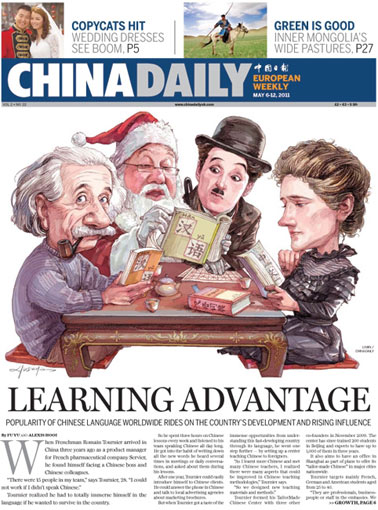From overseas press
China population turning-point to spur inflation: state economist
Updated: 2011-05-05 14:10
(Agencies)
China's census results show the world's second-biggest economy is nearing a demographic watershed that will auger wage rises, higher inflation and relatively lower growth, a prominent government economist said in comments published on Thursday.
Ba Shusong, a senior economist at the State Council Development Research Center, which advises the central government, said the 2010 census data issued last week, together with a clutch of other statistics, showed China's supply of abundant cheap labor would start shrinking soon.
"The current data show China has already crossed the Lewis turning point, and at the same time the window of the demographic dividend will soon close," Ba wrote in the Economic Information Daily.
Ba was referring to the Nobel-prize winning economist Arthur Lewis' theory that as a developing country modernizes, workers' wages begin to rise quickly once surplus rural labor shrinks to the point that labor shortages emerge.
"The shortages of rural migrant workers since 2004 have been no passing blip, but the signal that a major turning point is at hand -- a transformational trend," Ba wrote.
Many economists have forecast that China is entering a demographic transition that will produce far-reaching economic consequences. But the comments from Ba, who advises central policy-makers, showed how those concerns may feed into planning for inflation, growth and consumption in coming years.
The converging consequences of a disappearing labor surplus and the transition to an older population with more non-working retirees dependent on their families and welfare will be an "enormous challenge" for China, wrote Ba.
"Workers' rising wages will push up the cost core so that the low inflation possible when labor supply was abundant will be unsustainable," he wrote. "Second, after crossing the turning point, economic growth will experience systemic slowing."
Ba said China needed more even income distribution to ensure that consumption can shore up economic growth.
"The pace of investment growth will slow, and the driver of economic growth will shift from investment to consumption," he wrote.
E-paper

Head on
Chinese household care goods producers eye big cities, once stronghold of multinational players
Carving out a spot
Back onto center stage
The Chinese recipe
Specials

Bin Laden dead
The world's most wanted man was killed in a US raid in Pakistan.

British Royal Wedding
Full coverage of the royal wedding of Prince William and Kate Middleton in London. Best wishes

The final frontier
Xinjiang is a mysterious land of extremes that never falls to fascinate.
